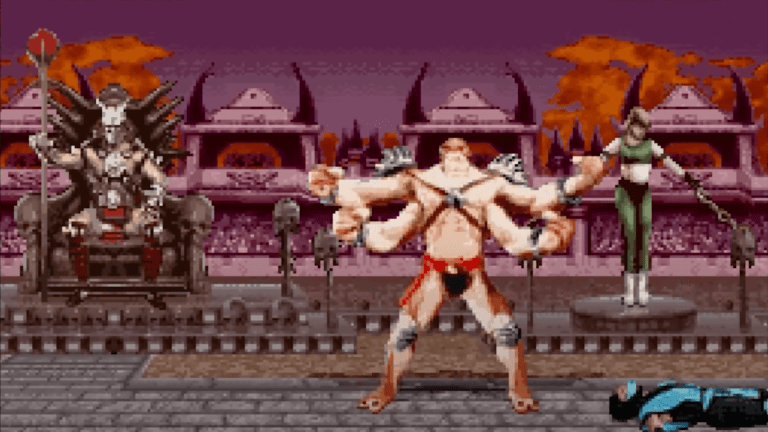Digital Eclipse Restores Fighting Game History with Mortal Kombat: Legacy Kollection
Mortal Kombat: Legacy Kollection's developers hint at what fans can expect in an interview at Evo 2025.

As the Mortal Kombat 1 era comes to a close, the wider Mortal Kombat franchise finds itself at a bit of a crossroads for how to proceed after its 2023 reboot. Digital Eclipse, which has handled well-received classic video compilations like Atari 50: The Anniversary Celebration and Teenage Mutant Ninja Turtles: The Cowabunga Collection, has highlighted the popular fighting game franchise’s foundational titles with its upcoming Mortal Kombat: Legacy Kollection. Set for release on all major modern platforms this September, Digital Eclipse provided a hands-on preview at the 2025 Evolution Championship Series, better known as Evo, with Den of Geek also interviewing some of the upcoming compilation’s development team.
The Mortal Kombat: Legacy Kollection contains over 20 games and, unlike Digital Eclipse’s previous title, the Street Fighter 30th Anniversary Collection, includes more than just arcade versions from the ‘90s. The Legacy Kollection compiles many of the major home versions of the classic Mortal Kombat games that launched and defined the franchise, even handheld titles on the Game Gear and Game Boy Advance, as well obscure ports like the Sega 32X version of Mortal Kombat II. Like many of Digital Eclipse’s projects, the Mortal Kombat: Legacy Kollection is a true labor love meant to celebrate the franchise as well as present these classic games to a new generation.
“The ‘90s is a special time for us as far as the heyday of arcades and how great and amazing those were. It’s also the 16-bit era of consoles and how things were growing and blossoming,” observes Digital Eclipse head of production Stephen Frost. “There are a whole host of people who grew up more casually with Mortal Kombat. Being able to create a product that’s compelling to them as well is really exciting and great.”
Like many game compilations by Digital Eclipse, especially Atari 50, the Mortal Kombat: Legacy Kollection weaves an interactive narrative tracing the history of the games included in the compilation. And while the opening set of sprite-based Mortal Kombat arcade games certainly make a cornerstone for the Legacy Kollection, the compilation also expands its reach to titles like 1996’s Mortal Kombat Trilogy and the franchise’s early 3D titles, Mortal Kombat 4 and Mortal Kombat: Deadly Alliance. The inclusion of Mortal Kombat 4 was a particular Herculean task, emulating the obtuse Zeus arcade hardware to create the first true home version of the game, which was crucial to honor this transitional period for Mortal Kombat.
“There has never been an official version of Mortal Kombat 4 arcade for home. There were home ports for the PlayStation and N64, but this is the first time that we get to run the original code in a home collection,” reveals Digital Eclipse content editor Dan Amrich. “It made my heart leap to be able to play this game again because it’s more accurate than any other emulation that I’ve seen out there. It’s really important because we wanted to tell that story and the story is propped up by the game. If Mortal Kombat 4 is not there, it becomes a question of how we can tell the story of Mortal Kombat 4 if our players can’t experience it for themselves and understand the context.”
To help fill out that context and narrative is a wealth of special features, including an interactive documentary and a wealth of behind-the-scenes photos and concept art, as a prominent part of the Legacy Kollection. All the major figures in the franchise’s formative years are interviewed, which naturally includes creators Ed Boon and John Tobias as well as many individuals at Midway Games and actors playing the characters. This bonus material highlights the mystique and appeal of Mortal Kombat that helped it endure and stand out from other fighting games at the time.
“If it was just about blood and gore, and shock value, it would’ve gone away in a year or two,” Amrich explains. “Mortal Kombat built this larger mythology. They didn’t just have a couple of ninjas. Scorpion hates Sub-Zero for a really specific reason. Sonya and Kano are mortal enemies and here’s why. You had a reason, beyond just the shock value, to get invested in these characters. With every successive game, you find out what happens next.”
“What Mortal Kombat really tried to do was build an interesting and mysterious story with an engaging number of characters,” Frost elaborates. “For a lot of fighting games, the story is a sidenote, whereas, with just a few words and images, John Tobias and those guys tried to create some very interesting characters and add in an air of mystery around them. I think what made the arcade games really popular is that you never knew 100% what those games were, especially before the internet.”
Both Frost and Amrich are longtime Mortal Kombat fans themselves, with Amrich naming Katana as his favorite for her color scheme and bladed fan weapons while Frost expresses a preference for Scorpion and Liu Kang, recalling being able to pull off Liu Kang’s Fatality for the first time playing Mortal Kombat II in an arcade as a surreal experience. With the Legacy Kollection, the two and the rest of the development team at Digital Eclipse get to share this experience with both fellow fans and newcomers alike, including with online multiplayer for the compilation’s bigger titles. And at a time when Mortal Kombat is looking where to go next, Mortal Kombat: Legacy Kollection highlights where this franchise’s celebrated story first began.
Developed and published by Digital Eclipse through Atari, Mortal Kombat: Legacy Kollection will be released September 30 for Nintendo Switch 2, Nintendo Switch, PlayStation 5, PlayStation 4, Xbox Series X|S, Xbox One, and PC. A physical version will be released on December 12, with preorders open now.
